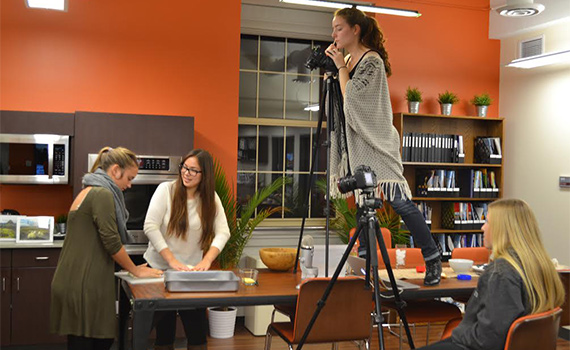
Four classmates work to record a video for the BreadX online course.
A lot of science, engineering, artistry, and culture have gone into that piece of crusty, buttered bread devoured at the dinner table. It’s those elements that are the basis for a new open online course, BreadX, soon to be launched by 51łÔąĎÍř first-year undergraduates for use by school-age students, grades six and up, worldwide.
Starting November 15, BreadX: From Ground to Global, on the EdX Edge , will guide participants in scholarly exploration of one of the world’s most ubiquitous foods and its global connections.
Fourteen Benton Scholars in Professor Karen Harpp’s first-semester seminar are developing the course, from concept to production and implementation. 
“One of the most important and compelling things to realize about this online course is that it is perhaps the first ever designed by students, for students (or at least one of the first). This is really a new approach to online education, in that it is a community experiment in global online course design,” said Harpp. “The design team is asking that everyone who participates become an active collaborator in the process by giving feedback about the course. They want to know how they might improve the educational activities and how they can make the experience more dynamic and effective. So if you join in, please send them your ideas for how to push the frontiers of education in new, exciting, and collaborative directions.”
The course will provide 10 days of content broken up into five subgroups. One subgroup will be released every other day until all five sections have been made available online.
“Bread can teach us about culture, science, society, and how we can conquer the challenges that face the world today,” said Jennifer Lundt ’19, of Santa Barbara, Calif.
Content includes:
From the Ground: Where do the ingredients for bread originate?
Bread Production: What is the science of making bread?
Food Distribution: How does bread get to your table: The ecological and socioeconomic impacts of food distribution
Cultural Perspectives: What is bread’s place in different cultures around the world, and what can it tell us about global health care and nutrition?
The Global Picture: How do problems that affect us as a planet originate at the local level, and how can everyone make a difference?
“The course will include materials to engage young audiences, with short supplemental readings, fun videos, and lots of discussion,” said Oneida Shushe ’19, of Albany, N.Y. “One of our goals is to create this caring online community, and one of the ways to do that is to foster a discussion. No matter where you are taking this, bread is probably a big part of your life.”
The content will begin to go live on November 15 via the EdX Edge platform for participants to access whenever it works best for their schedules. Anyone interested in participating or sharing this opportunity with middle schoolers (and anyone equally young at heart!), can register for more information about BreadX and the students behind the course.
Related Links
